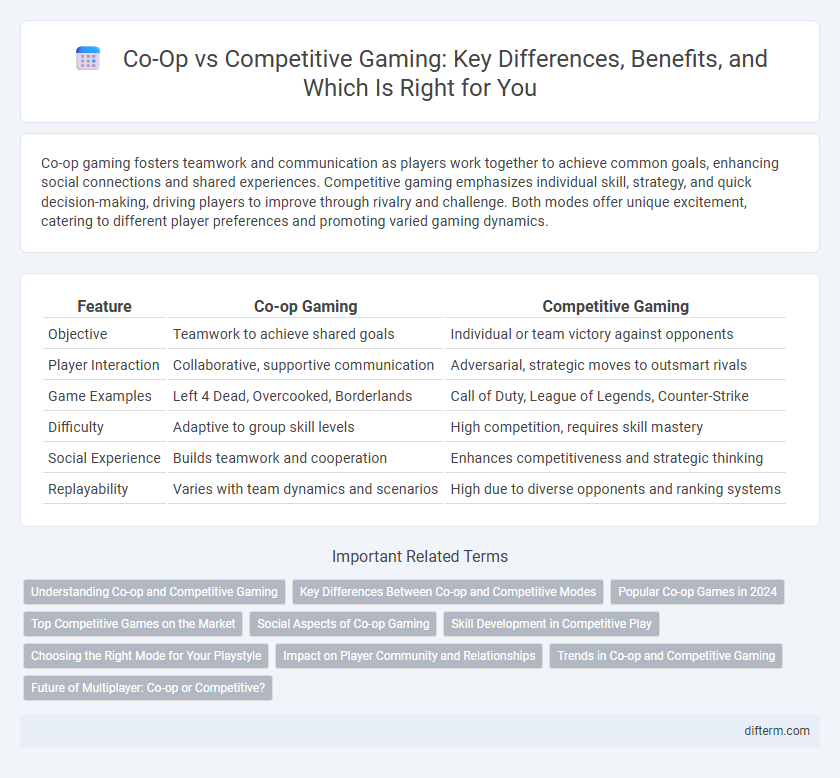Co-op gaming fosters teamwork and communication as players work together to achieve common goals, enhancing social connections and shared experiences. Competitive gaming emphasizes individual skill, strategy, and quick decision-making, driving players to improve through rivalry and challenge. Both modes offer unique excitement, catering to different player preferences and promoting varied gaming dynamics.
Table of Comparison
| Feature | Co-op Gaming | Competitive Gaming |
|---|---|---|
| Objective | Teamwork to achieve shared goals | Individual or team victory against opponents |
| Player Interaction | Collaborative, supportive communication | Adversarial, strategic moves to outsmart rivals |
| Game Examples | Left 4 Dead, Overcooked, Borderlands | Call of Duty, League of Legends, Counter-Strike |
| Difficulty | Adaptive to group skill levels | High competition, requires skill mastery |
| Social Experience | Builds teamwork and cooperation | Enhances competitiveness and strategic thinking |
| Replayability | Varies with team dynamics and scenarios | High due to diverse opponents and ranking systems |
Understanding Co-op and Competitive Gaming
Co-op gaming emphasizes teamwork and shared objectives, encouraging players to collaborate and strategize together to achieve common goals in immersive virtual environments. Competitive gaming centers on individual or team-based rivalry where players strive to outperform opponents, highlighting skills, quick decision-making, and adaptability under pressure. Understanding the dynamics of co-op and competitive gaming enhances player engagement by catering to diverse preferences for social interaction, challenge levels, and gameplay intensity.
Key Differences Between Co-op and Competitive Modes
Co-op gaming emphasizes team collaboration where players work together to achieve common objectives, fostering communication and shared strategy development. Competitive gaming centers on individual skill and rivalry, with players or teams striving to outperform each other in real-time challenges. Key differences include the primary goal--cooperative success versus competitive victory--and the distinct social dynamics that shape player interaction and game design.
Popular Co-op Games in 2024
Popular co-op games in 2024 like "It Takes Two," "Back 4 Blood," and "Sea of Thieves" emphasize teamwork and strategic collaboration, creating immersive multiplayer experiences that foster strong player connections. In contrast to competitive modes, these games prioritize coordinated objectives and shared challenges, appealing to players seeking cooperative gameplay rather than individual rivalry. The rising trend of co-op games reflects a growing demand for social interaction and collective problem-solving in the gaming community.
Top Competitive Games on the Market
Top competitive games like League of Legends, Call of Duty: Warzone, and Valorant dominate the market by emphasizing high skill ceilings, strategic depth, and intense player-versus-player action. These titles attract millions of players globally due to their rigorous ranking systems, frequent tournaments, and strong esports scenes. Competitive gaming fosters individual and team mastery, tactical decision-making, and rapid reflexes, setting it apart from cooperative gameplay experiences.
Social Aspects of Co-op Gaming
Co-op gaming fosters collaboration and strengthens social bonds through shared objectives and teamwork, promoting communication and trust among players. This social dynamic enhances emotional connections and collective problem-solving, creating a supportive gaming environment. Unlike competitive gaming, co-op emphasizes mutual success, reducing stress and encouraging positive interpersonal interactions.
Skill Development in Competitive Play
Competitive play sharpens critical gaming skills such as strategic thinking, quick decision-making, and adaptability under pressure. Players in competitive environments consistently face high-level opponents, which promotes rapid skill improvement and mastery of complex game mechanics. The intense nature of competition also fosters mental resilience and precise execution, essential for advancing in skill-based games.
Choosing the Right Mode for Your Playstyle
Co-op gaming emphasizes teamwork, collaboration, and shared objectives, making it ideal for players who enjoy strategizing together and supporting each other through challenges. Competitive modes prioritize individual skill, quick reflexes, and tactical dominance, catering to those who thrive on rivalry and leaderboard rankings. Selecting the right mode depends on whether you prefer cooperative problem-solving or testing your abilities against opponents in fast-paced, adversarial environments.
Impact on Player Community and Relationships
Co-op gaming fosters collaboration, strengthening player communities through shared goals and mutual support, which enhances social bonds and empathy. Competitive gaming drives skill improvement and individual achievement but can create rivalry and tension, potentially fragmenting player relationships. Balancing these modes promotes a dynamic gaming environment where cooperation nurtures camaraderie and competition fuels motivation.
Trends in Co-op and Competitive Gaming
Co-op gaming has seen a surge in popularity with titles like "It Takes Two" and "Deep Rock Galactic" emphasizing teamwork and shared objectives, fostering social interaction and collaboration. Competitive gaming, driven by esports titles such as "League of Legends" and "Valorant," continues to grow with increasing prize pools, global tournaments, and rising viewership on platforms like Twitch and YouTube Gaming. Trends highlight a balanced market where cooperative games appeal to casual players seeking community, while competitive games attract highly skilled players aiming for rankings and professional careers.
Future of Multiplayer: Co-op or Competitive?
The future of multiplayer gaming leans toward hybrid models that blend co-op and competitive elements, fostering collaboration within competitive frameworks to enhance player engagement. Emerging technologies like cloud gaming and AI-driven matchmaking are optimizing cooperative experiences while maintaining competitive balance, driving innovation in gameplay dynamics. Industry trends indicate a surge in socially-driven game designs that prioritize teamwork and rivalry simultaneously, reshaping multiplayer ecosystems for more immersive and diverse interactions.
co-op vs competitive Infographic

 difterm.com
difterm.com